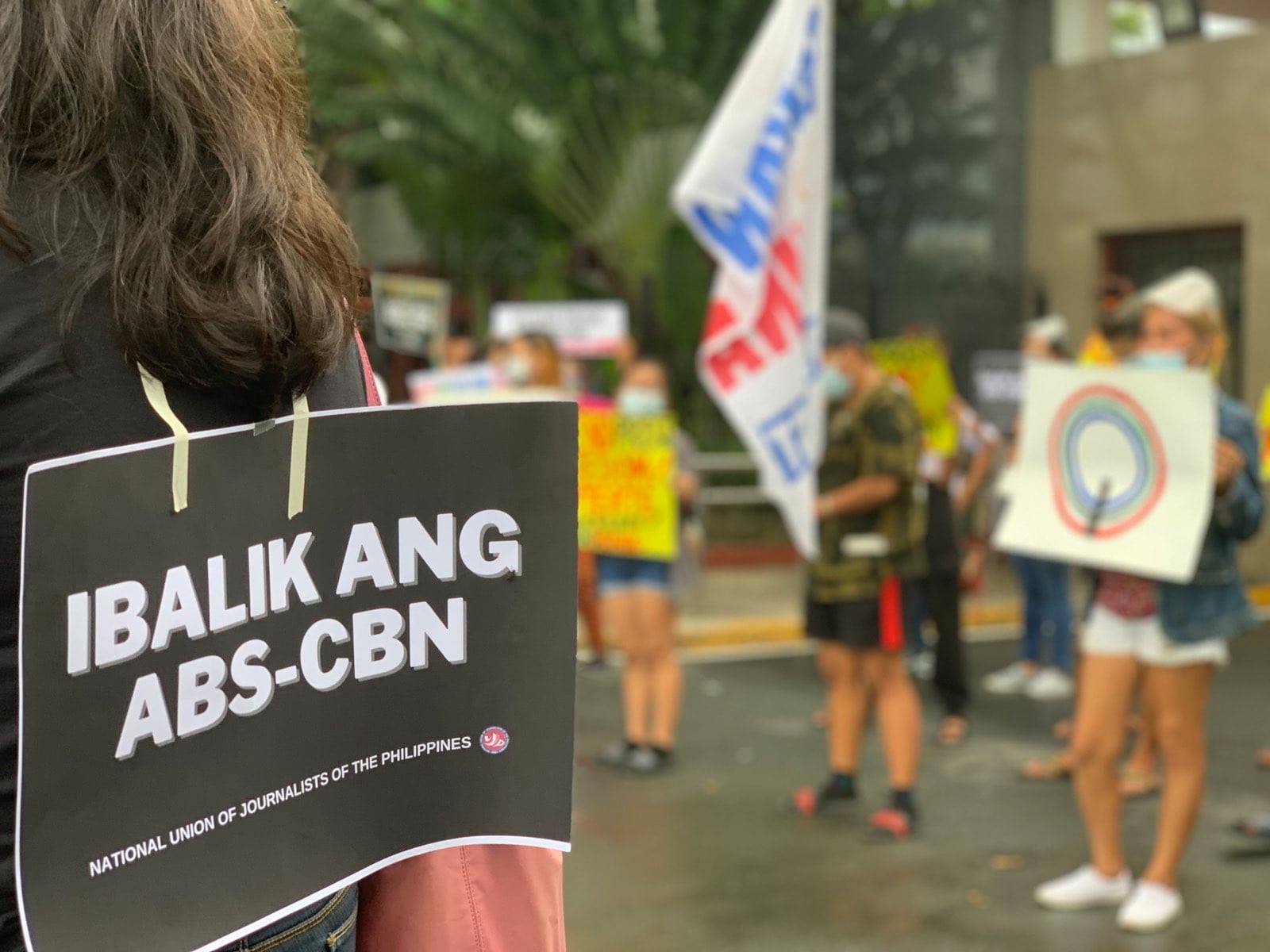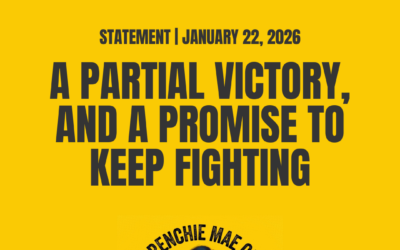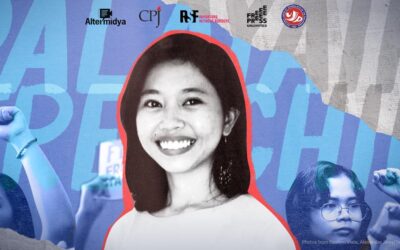A few days after decisively winning the 2016 elections, President-elect Rodrigo Duterte said: “Just because you’re a journalist you are not exempted from assassination, if you’re a son of a bitch.”
These words set the tone for the Duterte administration’s relationship with the press, fueling impunity and attacks against our ranks; actions reminiscent of the Marcos dictatorship, if not, as some commentators say, worse.
Five years after Duterte’s stinging rebuke, 20 journalists, mostly members of the community media, have been killed.
The latest victim, Renante Cortes, was shot right after his program on radio dyRb on July 22, just outside the radio station in Mambaling, Cebu City where he hosted his show.
It may yet emerge that Mr. Cortes’ death is not work-related but his shooting requires us, as it has others among his colleagues in the Cebu media, to call for an impartial investigation and a swift resolution to this case.
We have called for the same in other cases where journalists have been threatened, attacked or killed.
The use of lawfare against the media has never been more blatant. Under the cover of legal processes, the Duterte administration has unleashed the biggest assaults on press freedom with the denial of ABS-CBN franchise, continuing charges against Rappler, and made-up criminal cases against several community journalists.
From June 2016 until July 2021, the National Union of Journalists of the Philippines documented 230 cases of attacks on journalists, which include arrests and detention, filing of libel cases, intimidation, surveillance, red-tagging and cyberattacks, among others.
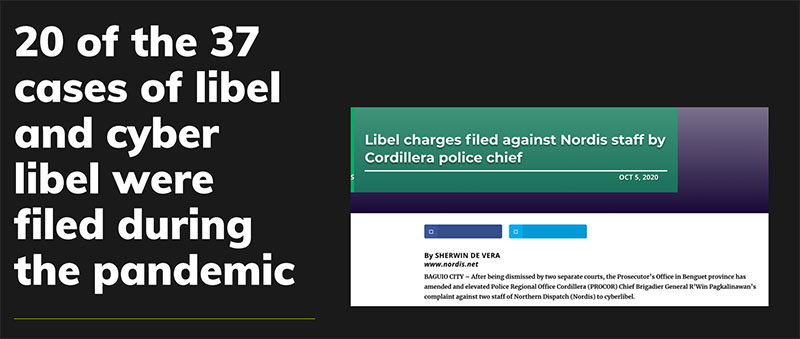
Reporters Without Borders (RSF), in its World Press Freedom Index this year, ranked the Philippines 138th, classifying the country’s press freedom situation as “very bad.”
RSF noted that the Philippines, along with Thailand, Cambodia and Indonesia, “adopted extremely draconian laws or decrees in the spring of 2020 criminalizing any criticism of the government’s actions, and in some cases, making the publication or broadcasting of ‘false’ information punishable by several years in prison.”
The Duterte administration enacted Republic Act 11469, or the Bayanihan to Heal As One Act, at the onset of the hard lockdown in 2020.
It contains a provision penalizing the spread of so-called false information with two months imprisonment. Penalties may also include a fine of not less than P10,000 up to P1 million.
On March 27, 2020, local police filed charges of violating RA 11469 against two journalists based in Cavite — Mario Batuigas and Amor Virata — for allegedly spreading false information about the COVID-19 crisis.
Radyo Natin Guimba in Nueva Ecija was also slapped with the same complaint, along with cyber libel, by government officials after it aired reports on aid distribution and pandemic response by the local government.
Twenty of 37 cases of libel and cyber libel against journalists were filed during the pandemic.
The filing of common crimes against journalists, however, is even more vicious. Three women community journalists were among those arrested in separate incidents of raids and charged with illegal possession of firearms and explosives.
Anne Krueger of Paghimutad was released on bail while Lady Ann Salem of Manila Today was freed following a local court’s favorable decision. Frenchie Mae Cumpio of Eastern Vista, however, remains languishing in a Tacloban jail since her arrest on Feb. 7, 2020.
Not content with criminalizing journalism, the Duterte administration ratified the Anti-Terror Act, which essentially makes it easier to label truth-telling, advocacy and dissent as terrorism or as support of it.
We hold that its provisions violate constitutionally-guaranteed rights such as freedom of speech, of expression and of the press.
Independent journalists who produce stories contrary to the official narrative are often accused of being communist propagandists or rebel sympathizers.
Often red-tagged, websites of alternative media outfits have been subjected to cyberattacks. Forensic investigation traced the attacks to the Philippine Army through the infrastructure of the Department of Science and Technology.
The DOST has denied involvement, saying only that the attacks could have been done by some other agency and that an IP address traced to the department does not mean the department is behind it. It has not promised further action on the attacks.
Media repression is coupled with orchestrated and well-funded troll armies engaged in peddling lies and discrediting legitimate sources of information.
The National Task Force to End the Local Communist Armed Conflict and the Presidential Communications Operations Office have been active in drowning the public in the venom that is disinformation.
With the intent of spreading fear and fortifying the chilling effect not only among journalists but also among the general public, the Duterte administration seems desperate in perpetuating itself in power beyond 2022.
Poorer during the pandemic
With the mishandling of the crisis, Filipino journalists and media workers have been hit hard by the pandemic.
The Digital News Report 2021 by the Reuters Institute notes major revenue drops because of the pandemic.
ABS-CBN suffered the biggest job losses after a House committee denied its bid for franchise renewal. The network laid off about 4,500 workers, including 2,674 regular employees.
The number does not include media workers in 53 regional stations which were also shut down.
The Digital News Report also revealed that the newspaper industry suffered due to distribution problems.
Two newspapers – SunStar Cagayan de Oro and SunStar Baguio – stopped printing, and ceased operations last year and since February this year, respectively. Others transitioned to online platforms just to survive.
Those in local TV and radio stations, including correspondents for national media outlets, had to endure pay cuts resulting from reduced work hours.
The pandemic has exacerbated the miserable economic conditions of journalists and media workers especially in the provinces. It must be noted that even before COVID-19, journalists and media workers outside Metro Manila have been suffering from low pay and lack of benefits.
According to an NUJP survey of more than 200 respondents in March 2021, 44% of journalists and media workers receive a monthly salary of P15,000 and below.
Fifteen percent get P5,000 and below, and most of them are in the provinces.
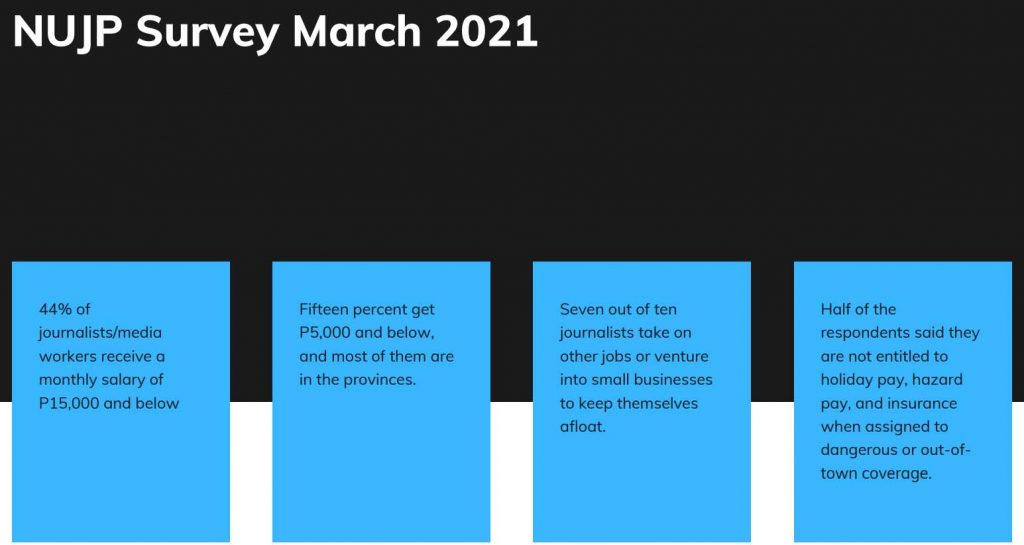
Similarly, a recent survey spearheaded by the Photojournalists’ Center of the Philippines showed that 27% of respondents said they get P30,000 per year or only P2,500 monthly.
Seventy-five percent of the respondents in the PCP survey said they are paid per photo, and 17% of them get less than P300 for each photo used.
NUJP’s focus group discussions with journalists outside Metro Manila corroborated this, with some photojournalists saying they receive as low as P150 to P75 per photo.
Seven out of 10 journalists in the survey said they have taken on other jobs or have ventured into small businesses to try to stay afloat.
Half of the respondents of the NUJP survey said they are not entitled to holiday pay, hazard pay, and insurance when assigned to dangerous or out-of-town coverage. Fifty-five percent of them also said they are not given overtime pay.
Nearly 40% do not have a health card. Thirty-five percent are not provided with personal protective equipment. Some journalists who were infected by the virus could not even afford hospitalization.
While we have been listed alongside frontline workers during this pandemic, the working conditions of many in the media contradict our label of being essential.
Solidarity and unity as our weapon
Amid the grim situation, Filipino journalists and media workers have not been taking the attacks sitting down.
The past five years also paved the way for solidarity among our ranks. Knowing that an attack on one is an attack on all, we have rallied behind ABS-CBN, Rappler, Philippine Daily Inquirer and alternative media in the face of threats against them.
Our colleagues have also used the press freedom situation as an opportunity to organize. In the wake of the franchise rejection, the ABS-CBN chapter has been revived and has grown into the largest chapter in the organization.
Journalists in Cebu and Baguio have also revived chapters there, adding to the already vibrant media communities in the Cordillera and Central Visayas regions.
Journalists, newsrooms and news organizations have also signed on to a pledge for coverage of the 2022 elections that will help empower voters and citizens as we approach a crucial period in our democracy.
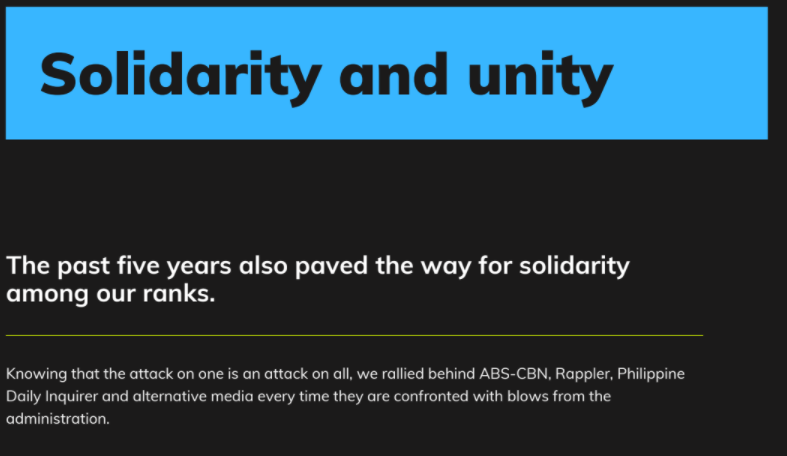
We have never stopped demanding justice for our fallen colleagues.
The masterminds behind the Ampatuan Massacre were convicted and put behind bars a decade after the gruesome incident. We look back at that initial victory as proof that justice — no matter how elusive — can be won if pursued vigorously.
We joined other sectors in questioning the constitutionality of the Anti-Terror Act.
Inside our newsrooms every day, we face and strike down our own fears by publishing stories that matter to our audiences.
As the late former NUJP Chairperson Nonoy Espina once said, “Press freedom does not belong to us. It belongs to the people. It is the freedom that we wield in their service, to serve their right to know. Like they say, only an informed people is armed with the knowledge to free themselves.”The tyrant wannabe is afraid of a free press, and of the people’s unity.
Kakapit-bisig ng mamamayan, tayong tagapagbalita ay tumitindig.
National Union of Journalists of the Philippines. July 24, 2021
—
Graphics adapted from Bulatlat.com

